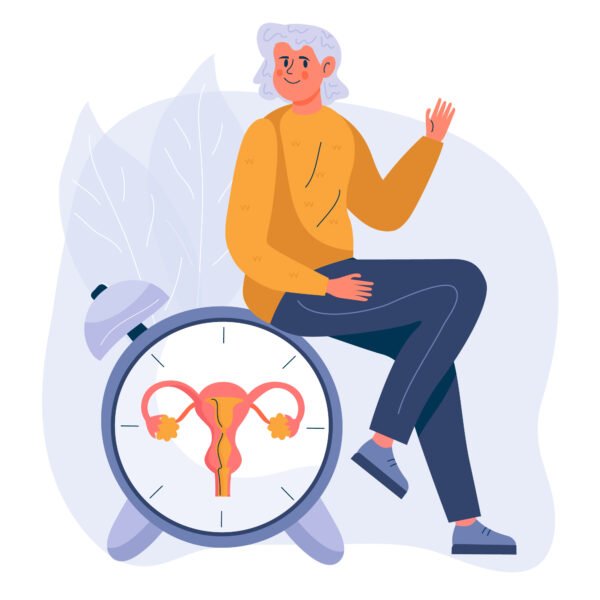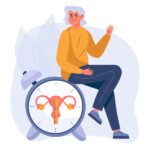Menopause: What to Expect in Your 50s
Menopause is a natural part of aging, marking the end of a woman’s reproductive years. It typically occurs between the ages of 45 and 55, with the average age around 51. For women entering their 50s, this life transition brings with it physical, emotional, and psychological changes as the body adjusts to declining hormone levels. While menopause is a universal experience, the symptoms and intensity can vary widely from one woman to another.
In this blog, we will discuss what you can expect during menopause in your 50s, from common symptoms to health considerations, and offer tips on how to manage this transformative phase of life.
What is Menopause?
Menopause is the time in a woman’s life when her ovaries stop producing eggs, and her levels of estrogen and progesterone decline significantly. It is diagnosed after a woman has gone 12 consecutive months without a menstrual period. Leading up to menopause is a phase known as perimenopause, during which hormonal fluctuations cause irregular periods and various symptoms.
Menopause marks the end of fertility, but it also signifies the beginning of a new chapter in life, often referred to as postmenopause, which continues for the rest of a woman’s life.
Common Symptoms of Menopause in Your 50s
The symptoms of menopause can vary in intensity, but many women experience similar signs as their hormone levels shift. Here’s what you might expect:
- Hot Flashes and Night SweatsHot flashes are one of the most common symptoms of menopause. These sudden waves of heat, often accompanied by sweating and a flushed face, can last from a few seconds to several minutes. Many women also experience night sweats, which can disrupt sleep and lead to fatigue during the day.
- Tip: Wear light, breathable clothing, sleep in a cool room, and avoid triggers like spicy foods, caffeine, and alcohol.
- Irregular PeriodsIn your 50s, you may notice that your periods become increasingly irregular, skipping months or becoming lighter or heavier than usual. This is a normal part of the transition toward menopause.
- Tip: Keep track of your periods to identify any patterns. If you experience excessively heavy bleeding or bleeding after menopause, consult your doctor.
- Vaginal Dryness and DiscomfortAs estrogen levels drop, the vaginal tissues can become thinner and drier, which may lead to discomfort during intercourse or urinary issues.
- Tip: Over-the-counter vaginal moisturizers or lubricants can help. If symptoms persist, talk to your doctor about hormone therapy or other treatments.
- Mood Swings and IrritabilityHormonal changes can impact your mood, leading to irritability, anxiety, or even depression. Many women also report feeling more emotional or experiencing mood swings during menopause.
- Tip: Regular exercise, mindfulness techniques, and talking to a therapist can help manage mood fluctuations. If depression or anxiety becomes overwhelming, consult a healthcare provider.
- Sleep DisturbancesMenopausal women often experience sleep problems, either due to night sweats or difficulty falling asleep. Insomnia can leave you feeling tired, irritable, and less focused during the day.
- Tip: Practice good sleep hygiene, including maintaining a regular sleep schedule, avoiding caffeine late in the day, and creating a calming bedtime routine.
- Weight GainMany women notice weight gain, especially around the abdomen, during their 50s. This can be attributed to a slowing metabolism, hormonal changes, and lifestyle factors.
- Tip: Stay active with regular exercise, including strength training and aerobic activities. A healthy, balanced diet rich in fruits, vegetables, and whole grains can help manage weight.
- Memory and Concentration IssuesSome women experience what’s known as “brain fog” during menopause, including difficulty concentrating or remembering things. While these cognitive changes can be frustrating, they are often temporary.
- Tip: Keeping a journal, creating to-do lists, and engaging in activities that stimulate your brain, such as puzzles or reading, can help improve focus and memory.
Health Considerations in Your 50s
Menopause not only brings symptoms but also affects your long-term health. As estrogen levels decline, women are at greater risk for certain health conditions. It’s important to be proactive about your health during this time.
- Bone HealthEstrogen helps protect bones, and the decline in estrogen during menopause increases the risk of osteoporosis, a condition that weakens bones and makes them more prone to fractures.
- Tip: Ensure you’re getting enough calcium and vitamin D, either through your diet or supplements. Weight-bearing exercises like walking, dancing, or resistance training are also great for strengthening bones.
- Heart HealthAfter menopause, the risk of heart disease increases, partly due to the drop in estrogen. Other factors like weight gain, higher cholesterol, and high blood pressure can contribute to heart problems.
- Tip: Adopt heart-healthy habits such as regular exercise, maintaining a healthy weight, eating a balanced diet, and avoiding smoking.
- Mental HealthDepression, anxiety, and mood changes can become more common during menopause, especially for women with a history of mental health issues. Staying socially connected and seeking professional support when needed is important.
- Tip: Don’t hesitate to reach out to a therapist or counselor if you’re feeling overwhelmed. Engaging in relaxation techniques, meditation, and hobbies that bring joy can also help alleviate stress.
- Sexual HealthChanges in libido and vaginal dryness can affect your sexual health during menopause, but this doesn’t mean your sex life has to suffer. Open communication with your partner and healthcare provider can help manage these changes.
- Tip: Vaginal moisturizers, lubricants, and hormone therapy can help with vaginal dryness, while talking to a doctor about sexual concerns can provide personalized solutions.
How to Manage Menopause Symptoms
Managing menopause symptoms involves a combination of lifestyle changes, medical treatments, and self-care practices. Here are some strategies to help you feel your best during this time:
- Exercise RegularlyPhysical activity can help reduce symptoms like weight gain, mood swings, and sleep disturbances. Aim for a mix of cardiovascular exercise, strength training, and flexibility exercises to keep your body strong and energized.
- Eat a Balanced DietFocus on nutrient-dense foods that support bone health, heart health, and overall wellness. Incorporate plenty of fruits, vegetables, lean proteins, and whole grains into your diet, and limit processed foods, sugar, and unhealthy fats.
- Consider Hormone Replacement Therapy (HRT)Hormone replacement therapy can help relieve severe menopausal symptoms by replacing the estrogen your body is no longer producing. However, HRT comes with risks, so it’s important to discuss the benefits and drawbacks with your healthcare provider to determine if it’s right for you.
- Stay HydratedDrinking plenty of water can help manage hot flashes and night sweats. Staying hydrated also combats dry skin, which can become more noticeable during menopause.
- Get Regular Health ScreeningsRegular check-ups with your healthcare provider are important to monitor your bone density, cholesterol levels, and overall health. Mammograms, Pap smears, and other screenings should continue as recommended by your doctor.
Embrace the Next Chapter
While menopause is often associated with discomfort, it is also a time of personal growth and reflection. Many women find that their 50s offer a sense of freedom and empowerment. With children grown or careers established, this can be a time to focus on self-care, pursue new hobbies, travel, or deepen personal relationships.
It’s important to remember that every woman’s experience with menopause is unique. By staying informed, prioritizing your health, and seeking support when needed, you can not only manage the symptoms but also embrace this new stage of life with confidence and optimism.
Final Thoughts
Menopause in your 50s is a natural part of aging, bringing with it both challenges and opportunities. By understanding what to expect and taking proactive steps to care for your physical and emotional health, you can navigate this transition with grace and resilience. Whether it’s through lifestyle changes, medical interventions, or emotional support, the key is to approach menopause as a time of empowerment and self-discovery.





